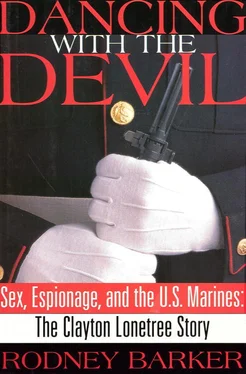“He made a mistake,” civilian counsel admitted, “but he did not betray his oath.”
Lonetree’s error, as described by Mike Stuhff to the jury, was in having ambitions beyond his capabilities.
There was a corollary to this theory, which Stuhff introduced toward the end of his opening statement, a provocative explanation for the failure of Sergeant Lonetree’s efforts. It drew on information that had come to his attention through the release of State Department cables that revealed the Soviet whom Lonetree knew as “Uncle Sasha” was in actuality a KGB officer by the name of Aleksei Yefimov, a man who as well as recruiting Lonetree had had regular contacts with an official at the U.S. Embassy in Moscow by the name of Shaun Byrnes. While those meetings were described by the State Department as “backchannel conversations” that went on all the time in the diplomatic community, to the suspicious defense counsel something a good deal more nefarious was implied. In Stuhff’s mind it raised the possibility that at the same time Lonetree was conducting his private counterintelligence operation, the CIA was aware of his activities and allowed them to continue because they were useful to a larger scheme that it was running. And that was providing Uncle Sasha, who in reality was a double agent working for the CIA, with the kind of credibility and success he needed to secure and even advance his position within the KGB.
After the trial, when he was asked by a journalist if this spy-thriller scenario wasn’t a bit of a stretch, Stuhff would shake his head and reply that the characterization was forthright. It complied with the facts as he knew them. He was convinced the CIA knew more than it was letting on. And even though it was admittedly “kind of a bank shot,” he thought it would give the defense a fighting chance, over the course of the trial, at creating reasonable doubt in the minds of the jurors.
• • •
It didn’t make any difference to Major Beck what strategy the defense decided to employ, because he had a clear and strong vision of how this case ought to be prosecuted, and he had blocked it out from opening to closing.
At the start, he wanted the jury members to know what training and instructions Sergeant Lonetree had received at Marine security guard school before he ever went to Russia. To provide them with that information he called on one of Lonetree’s former instructors and a State Department official who gave courses at MSG school. He had them brief the court the same way MSGs were briefed, specifically about their responsibilities to safeguard classified information, and what to watch out for from hostile intelligence activities. By the time these witnesses left the stand, all in attendance felt a little as if they too had attended those classes.
The testimony they heard established that Marine security guards were warned they would be high-priority targets because they had access to classified material and because they controlled access to the embassies. Traditional methods of recruitment and exploitation were discussed. Specific examples were given about how women and alcohol were frequently used to compromise and recruit foreigners. A briefing specific to the Moscow post was also repeated, in which Marines were told to keep their distance from Soviet citizens working in the embassy, especially those who were overfriendly or inquisitive, because the only Soviet citizens who were allowed to commingle with foreigners in the Soviet Union were officers, agents, or co-optees of the KGB. They were told to expect that sooner or later they would be approached, and they were told to report the contact to their superior for counterintelligence purposes.
After establishing Lonetree’s primary responsibilities as an embassy guard, Beck brought in Big John and Little John. They testified that when Sergeant Lonetree spoke with them in Vienna, he admitted that he had broken the rules, that he had failed to report his contacts with Soviet citizens, that he had become romantically involved with a Soviet woman, and that he had allowed his involvement to expand to include a conspiratorial relationship with a person she called her Uncle Sasha, and later Yuri Lysov, to whom, in the simplest terms, he passed information related to the national defense, all in violation of orders and ignoring training, common sense, and loyalty.
Having seen what can happen when a witness comes into court who has not been adequately prepared and is hearing questions for the first time on cross-examination, Major Beck made a point of always interviewing his witnesses at least once before trial. In an effort to let them know what to expect, he would try to anticipate everything the other side would ask, and give them a more thorough cross-examination than they could expect to receive when they took the stand. That was why, before calling the Johns as witnesses, he had put them on the firing line. He had challenged their credibility, accusing them of all but beating Lonetree with rubber hoses to soften him up for a confession to the NIS.
“What do you mean you just meant ‘confidential channels’ when you told him you’d keep your conversations ‘confidential’? What would you expect a twenty-three-year-old to think you meant? You knew he had an alcohol weakness—how much liquor were you giving him during these meetings?”
By the time he had gotten through with them, both Johns had been so stirred up they were ready to lunge across the table and grab him by the throat. But just when tempers were threatening to get out of hand, Beck had said, “Now, when you face Bill Kunstler, Mike Stuhff, or Dave Henderson, you’ll be ready for anything they throw at you.”
The defense did its best to rattle the Johns. It hit them on the promise-of-confidentiality issue. It accused them of manipulating Clayton Lonetree’s passivity and malleability to keep him talking.
But both Big John and Little John fielded the cross-examination questions without an error. Lonetree had come forward spontaneously, they said. He’d been eager and willing to talk. The meetings were arranged at his convenience. He was told time and again they were in no position to promise him immunity. And when he admitted to providing information and material at the direct and repeated request of Uncle Sasha, for which he said he had received money, there was no question that he knew that what he was turning over was classified secret and confidential.
During the testimony of Big John and Little John—who later told Major Beck that after the grilling he’d given them, the defense’s cross-examination had been “a breeze”—Major Beck introduced as exhibits several important pieces of evidence that the two Johns said Lonetree had spontaneously brought to them during the ten days he was debriefed. These included photos of Violetta and letters he’d received from her in Vienna, and slips of paper on which the dates and descriptions of meet sites with Uncle Sasha were written.
After hearing from several of Lonetree’s former barracks mates who testified that he often praised the Soviet system and the KGB over the United States and the CIA, that his room was so full of Soviet flags, posters, and books it looked like a shrine to Communism, and that he appeared to have such an obsession with Russians that he was jokingly called by some “Comrade Lonesky,” the prosecution played its face cards. It called to the stand the NIS agents to whom Lonetree had admitted passing secrets to the KGB. And from direct examination of special agents Moyer, Sperber, and Hardgrove, Major Beck elicited the details of what happened once they took Sergeant Lonetree into custody—beginning with the issuance of rights warnings, through the interrogations in Vienna and London, to the result: two sworn statements that in Lonetree’s own words described his criminal activities.
Читать дальше












